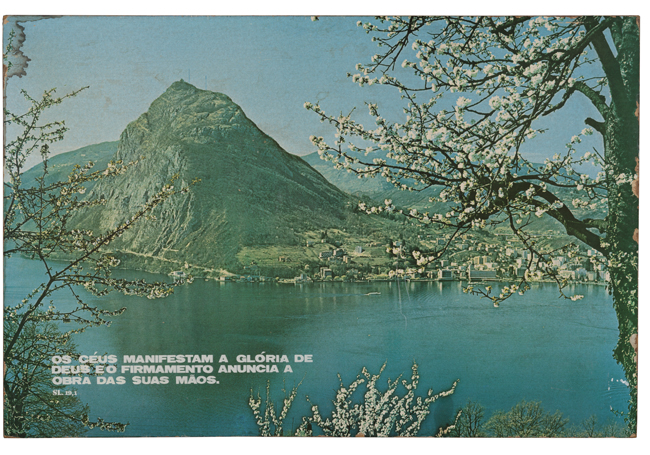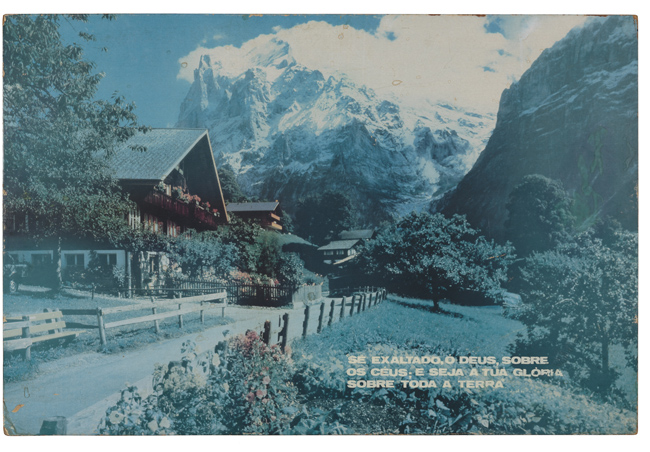MERIÇ ALGÜN RINGBORG
— My grandfather was as an operator on freighters traveling around the world. He traveled from the northern parts of Russia to Cape of Good Hope in Africa, from Brazil to Japan to Canada. He started working on ships right after his mandatory military service in Zonguldak, a city located in the Black Sea region of Turkey, when he was in his early 20’s and he worked until he got cancer at the age of 65. He had five daughters. And he met three of his five grandchildren. He was gone nearly every six months of the year so his presence was, and therefore the memory of him, is very fragmented. He brought gifts and souvenirs for each member of his family every time he returned.
On one of his returns from Brazil, he brought two landscape prints mounted on wooden boards and on the prints there were two sentences in Portuguese. They were hung in the kitchen where time was spent most. It was assumed that the photographs were taken in Brazil but nobody spoke a second language in the family so nobody knew what the texts meant. However, perhaps in an attempt to feel closer to him, one of the two sentences had been memorized by every member of the family and repeated out loud during meals a tad humorously, a tad sentimentally. Nevertheless, it was almost like a prayer.
Turkish is a phonetic language so things are read as they are written. It goes like this:
osceus manifasitam aglorya dedeus eofirmamante anunçia obradasuasmaos
The kitchen where this took place was in a house that he built. Everyone moved out one by one and the house is now long gone. So the prints changed location and ended up under some bed from where I recovered them last winter. The thing I noticed first was the SL.19,1 under one of the sentences in small type and I immediately realized that these were verses from the Bible. After hearing it from my aunts so many times, I have internalized this text and I felt rather stupid finding the source to be the Bible. Nobody in the family is particularly religious. And if there is a religion vaguely present, it certainly isn’t Christianity.
As the next step into deconstructing this memory, I would really like to know where these places are. I image searched them on Google but couldn’t find the right match. Someone said they might be in Rio de Janeiro but they weren’t sure. If anyone reading this recognizes where these places could be, please do contact me at: mericalgun[at]gmail.com


—
Meriç Algün Ringborg was born in 1983, in Istanbul, and currently lives and works in Stockholm. The contrasting differences between the make-up of both cities – Istanbul and Stockholm – particularly socially and politically, as well as her movement between the two, play a key role in her practice. Her work concentrates on issues of identity, borders, bureaucracy, language and translation through appropriated and “ready-made” texts, dictionaries and archives. She had solo exhibitions at Moderna Museet in Stockholm (2014); Contemporary Art Gallery, Vancouver (2013); Art in General, New York (2013) and Witte de With in Rotterdam (2012). She has participated in group exhibitions such as LEAVING TO RETURN, 12th Cuenca Biennial (2014); A THOUSAND DOORS, a collaboration between Whitechapel Gallery and Neon Foundation at The Gennadius Library, Athens (2014); WHEN ATTITUDE BECOMES FORM BECOME ATTITUDES at MoCA, Detroit and CCA Wattis, San Francisco (2012-13) and UNTITLED (12th Istanbul Biennial) (2011). Her work has been featured in numerous publications such as ArtReview, Frieze, Mousse, Glänta and The Paris Review amongst others.
